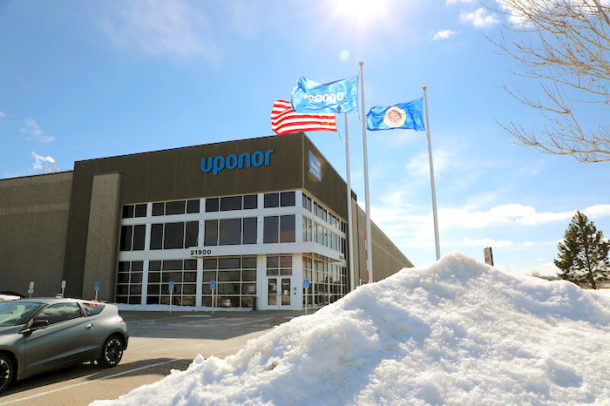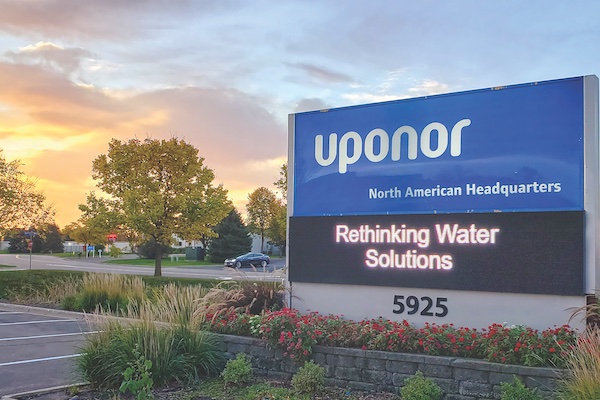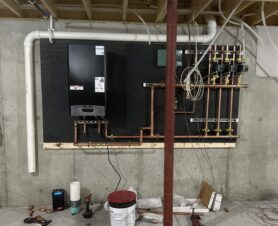
In our continuing Industry Forecast series, we talk with John Reutter, Interim President, Vice President, Finance, Uponor North America, on topics such as the short-term economy, supply chain issues, and lessons learned over the course of the pandemic. Here is our exclusive Q & A with
MH: Do you project a turnaround soon or within the next 6-12 months for certain materials that relate to your specific company?
Reutter: Signs are pointing towards some positive change with the supply chain, but there’s far too much unknown to say for certain that these constraints will improve in the next year. What we are focused on is securing secondary supply routes for our most important resources to help meet demand—and being a good partner for our customers by ensuring open and transparent communications.
MH: We are in the midst of some of the highest inflation rates since the early ‘80s. Do you think that higher inflation becomes a “newer normal”? Explain.
Reutter: No one ever wants to settle on higher inflation as a normal means of doing business. That said, I do believe we are near a peak inflationary environment with relief on its way. Unfortunately, Russia’s invasion of Ukraine will put a strain on the energy sector which will most likely cause the descent of inflation at a slower pace than we saw the ramp up. The best we can do is focus on what we can control and make sure our teams have the tools and resources they need to be successful move through the new year.

MH: In general, how do you see the economy short-term? Give a few examples of how you draw that conclusion.
Reutter: While there are certainly inflationary challenges, retail spending is up, and employment recovery continues along with wage growth. Couple that with declining COVID-19 cases and a general desire to move to an endemic environment, I believe we will see an uptick in the hospitality and travel sectors along with small business growth. These segments generally fuel short term economic recovery.
MH: Where are you seeing signs of positivity, if any?
Reutter: Residential and commercial demand for polymer piping is stronger than it has ever been. Contractors, builders, and designers continue to explore ways to integrate a complete polymer solution into their projects. We are working to deliver premium products that enrich the lives of our customers around the world, while conserving the scarce resources we are given.
MH: How do you as manufacturers work with customers who are dealing with longer lead times and/or higher prices? Is it a matter of open lines of communication?
Reutter: Everything starts with transparent communication. We are constantly maintaining open lines of communication with our customers through our factory sales team, rep agents, and distributors to ensure they have the most up-to-date information about Uponor. While we have had to make several price adjustments during the pandemic, it has been our open and transparent messaging that has maintained good standing with our customers.

MH: It seems that in today’s employment landscape, it’s hard to find good labor, whether it’s truck drivers, waiters at restaurants, etc. In our industry, how do we continue the fight to highlight the trades as a great career choice?
Reutter: The need for skilled labor continues to grow. Increased wages and expanded career opportunities are a direct reflection of that demand. Uponor partners with several schools and universities to celebrate the opportunities available to students and workers looking to make a career change.
The fight to find talent starts with meeting the candidates on their terms – whether that’s through social media posts, job fairs, school visits, or community partnerships. We offer great wages, competitive benefits packages, and an award-winning culture that has been recognized as a top workplace for nearly a decade.
MH: In spite of COVID, people must move on. How has your company evolved—or continued to march forward—over the past two years, and talk about any new initiatives, expansions, etc.
Reutter: While our production team has been going strong throughout the pandemic, our office workforce has taken on the challenges in a productive, efficient way. We recently introduced our Flexible First program, a reimagined take on the traditional office space. With three unique employee personas – Resident, Hybrid, and Remote – our employees can perform in an environment that works best for them. We’re in the process of redesigning our corporate offices and will hold Flexible First as our standard moving forward.
You can learn more about Flexible First by reading this release from earlier in the year.



